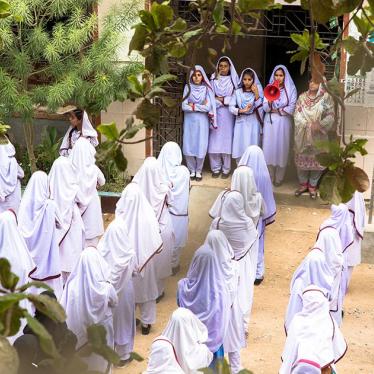- Children and their families seeking asylum in the United Kingdom face inadequate living conditions in government-provided temporary housing, affecting their health, well-being, and education.
- The dire temporary conditions, often for a year or more instead of what the 19-day policy calls for, are the result of longstanding policy failings, wasted resources, and funding cuts.
- Instead of wasting resources on grudging, deficient, and short-sighted responses, the UK government should redirect its funding toward suitable long-term housing and social support.
(London) – Children and their families seeking asylum in the United Kingdom increasingly face inadequate living conditions in government-provided temporary housing, affecting their health, well-being, and access to education, Human Rights Watch and Just Fair said in a report released today.
The 100-page report, “‘I Felt So Stuck’: Inadequate Housing and Social Support for Families Seeking Asylum in the United Kingdom,” found that families seeking asylum face inhumane conditions in temporary housing, including rat infestation and mold. The families experience daily struggles to get food their children will eat, as well as mental and physical health problems and serious disruptions to their children’s education.
“Government policy is directly damaging the health and well-being of vulnerable children and their families who have come to the UK seeking safety,” said Jess McQuail, director of Just Fair. “Instead of pitting people seeking asylum against people already living in the UK, the government should use its available resources to ensure that everybody’s rights are met.”
The dire conditions are the result of longstanding policy failings, including an inefficient and under-resourced decision-making system, the groups found. The government has wasted resources on its effort to send asylum seekers to Rwanda and cut legal aid and other funding. These choices have contributed to a huge backlog of asylum cases.
Human Rights Watch and Just Fair interviewed more than 50 people seeking asylum, including 27 children, who were living in or had recently left temporary housing in cities and towns across England. Under UK Home Office guidance, people seeking asylum should spend no more than 19 days in hotels or other initial accommodation before they receive suitable longer-term housing. But many families said they had spent many months, in some cases well over a year, in temporary housing.
While they all expressed appreciation for the UK government’s support for asylum seekers, they said that protracted stays in close quarters, in some instances far from schools, doctors, shops, and parks, affected their physical and mental health.
Health professionals have warned that an increasing number of children in temporary housing suffer from malnutrition and other health issues. Many of the parents interviewed by Human Rights Watch and Just Fair said their children lost weight while in temporary housing, in some cases to such an extent that their doctors expressed concern for the children’s health and development.
The father of a family in a hotel in Tower Hamlets, east London, said that his 4-year-old daughter “loves vegetables! She only eats things that are green at the moment. This is not what we are given.” He said her weight has dropped dramatically. “I did not know what to do, now we go to two different food banks each week to get fruit and vegetables for her.”
Families also said their mental health deteriorated while in temporary accommodation. The four months a 36-year-old woman from Libya and her family spent in temporary housing in Scarborough, in northeast England, were particularly difficult for her 14-year-old son. “He’s crying all the time; sometimes he won’t leave his room for two days,” she said.
Access to education was also a major issue. The Home Office does not appear to take into account the educational needs of children when it assigns temporary housing. Children in some cases have to wait until the following school year before they can attend classes. “I feel so hopeless and heartbroken about this,” said a 17-year-old boy from Afghanistan who had been out of school for four months since arriving in the UK.
The UK government’s general approach to asylum raises serious human rights concerns. In August 2023, the Home Office began to use a barge in Dorset, the Bibby Stockholm, to accommodate adult men seeking asylum even after firefighters warned that “serious fire and safety concerns” made the vessel a “potential deathtrap.” Days later, officials had to close the barge after Legionella bacteria were found in its water system.
Home Secretary Suella Braverman and other UK officials have claimed that restrictive measures will deter people from making irregular journeys. In fact, studies of migration and asylum policies in the UK and elsewhere have found that they have little deterrent effect.
The Home Office should ensure that families with children receive suitable long-term accommodation in houses or flats as quickly as possible, strictly applying its 19-day guideline as a deadline for transfer out of hotels or other temporary housing, the groups said.
Unaccompanied children should be placed in housing that offers the care and protection to which they are entitled. In line with a July 2023 High Court decision, they should not be placed in contingency hotel accommodation.
Barges, barracks, and similar large-scale institutionalized settings share the serious shortcomings of repurposed hotels and should not be used as asylum housing in the UK, Human Rights Watch and Just Fair said. Instead, people seeking asylum should be supported to find their own housing in communities they choose and should be allowed to work as long as their cases are being considered, the approach used in the UK until 1999.
“Inhumane and inadequate housing for people seeking safety is never acceptable, and certainly not in the world’s sixth-largest economy,” said Yasmine Ahmed, UK director at Human Rights Watch. “Instead of recklessly wasting resources on grudging, deficient, and short-sighted responses, the UK government should redirect its funding toward suitable long-term housing and social support.”
Case Studies
16-year-old unaccompanied boy from Afghanistan
Yesal H., originally from Afghanistan, arrived in November 2021. He fled when the Taliban took over as his father had worked for the Afghan government. The two were separated in Kabul, and Yesal made the journey alone. When he arrived he was 16, but his age was recorded as 25 and so he was placed in an adult hotel in Bournemouth.
He said his main concern was that the officials would not believe his age and that he wanted to learn English and continue his education. “I want to make a future for myself,” he said. “In a hotel, you cannot make a life.” He also told us the hotel does not facilitate access to schooling. “I did up to Grade 8 in Afghanistan. I have a great passion for education, I want to learn more than anything. I am trying to do language classes or enroll in school, but nothing has happened yet.”
“I have completely lost sleep; I am worrying all the time about my father and where he is. I worry about how my life has changed, and about how I will continue. I have had a very hard time understanding what has happened.”
Family of five from El Salvador
A couple and their three children, ages 4, 7, and 15, left El Salvador after they were threatened by criminal gangs and sought asylum in the UK. They were placed in a hotel in east London’s Tower Hamlets in September 2021. The family of five shares one crowded room with three triple-decker bunk beds and one bathroom. The father says it is not an adequate space for a family and definitely not an appropriate space for children: “Here we feel penned in like we are animals.” His 7-year-old son said to him, “Papa, this is like a prison.” His 15-year-old daughter added: “I have no space to myself and no privacy from my family. I do all my homework in my room. We eat all our meals on the floor of the room. I am sick of living like this.”
Family of five from Vietnam
A couple and their three children, ages 1, 11, and 17, claimed asylum in March 2021 after fleeing political persecution in Vietnam. The family had been living in hotels in London for over two years. The 17-year-old had to commute to school for two to three hours each way by bus for the first nine months. The journey took a toll, and she was concerned about her A-level exams. She said, “Six hours a day spent travelling is making me so tired.... I get home after the long journey and have no energy or concentration left to study. I just want to sleep.”









